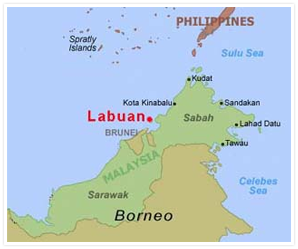offshore banking in labuan

Few have heard of Labuan, a small East Malaysian island in the South China Sea. Once a British base used to suppress piracy, the island's free port is today a principal transshipment point for the region. The island has broad, white beaches, and skin divers are attracted to the surrounding coral reefs
Labuan was declared a tax haven in 1990 as the first step toward developing it into Malaysia's own offshore financial centre.

Although firmly established on the world's offshore map, Labuan has not been attacked during the recent offshore witch hunt.
Would this have something to do with the power wielded by Malaysia's rabble-raising, vociferous Prime Minister Mahathir? Mahathir has in the past expressed the view that George Soros and other currency speculators should suffer the death penalty (for the "damage" their actions can cause to the economies of developing countries) -- perhaps the OECD powers wisely chose to stay away from that particular conflagration?
Little Labuan did make it onto a ridiculous blacklist compiled by the Financial Stability Forum (FSF).
It attained intermediate status for having a regulatory system that was not quite up to scratch and thus was viewed as a potential threat to the world's economic stability.
The FSF is a grouping of regulators and Dr Mahathir might wish to know that the Chairman of the FSF is one Andrew Crockett.
Whatever the reason, Labuan has remained a low-key if somewhat underused tax haven, attractive for those wishing to conduct business away from the OECD spotlight.
Over the past ten years or so, Labuan has registered a mere 2,500 companies (as compared to some Caribbean jurisdictions with more than 100,000). Mohammad Razif, director-general of the Labuan Offshore Financial Services Authority, says:
"We don't want to be like other offshore tax havens, which are just a nameplate. We are not worried about numbers."
Offshore Trading Companies in Labuan pay 3% on net audited profits or a fixed sum of RM 20,000, whichever is lower. Offshore Non-Trading Companies do not pay tax.
Both trading and non-trading companies may elect to pay the maximum tax of RM 20,000 per annum and will consequently be freed from the requirement to file financial statements.
There are no capital gains taxes, contract note duties or exit levies.
Labuan does not impose any disclosure requirements as regards beneficial ownership.
It is worth mentioning that Labuan even has its very own stock exchange -- the Labuan Financial Exchange (LFX). LFX allows the listing of equities, investment funds, debt instruments and insurance-related instruments based on either conventional or Islamic principles.
Infrastructure and Economy
The Nation is economically strong and politically stable. Under the guidance of LOFSA (the Labuan Offshore Financial Services Authority) the Malaysian authorities have invested heavily into the improvement of Labuan's physical infrastructure, which is completely modernised and provides a state of the art telecommunications system including an Internet Gateway which provides an e-commerce platform. More than 50 of the world's top banks have branches in Labuan
Labuan Offshore Banking
Offshore banking can only be carried on in Labuan by an offshore company or a foreign offshore company incorporated or registered for that sole and exclusive purpose, and by an office, branch or subsidiary of a licensed Malaysian bank.
To apply for an offshore banking licence, an application needs to be made to the Labuan Offshore Financial Services Authority (LOFSA) providing a guarantee and minimum capital funds of RM10 million. An annual fee of RM80,000 (at the time of writing) is payable to the Central Bank no later than 15 January. Accounts have to be audited and filed with the Central Bank annually.
An offshore bank may conduct a wide spectrum of financial activities, including the management of investment portfolios, accepting foreign currency deposits, borrowing or lending money to Malaysian residents, making loans to foreigners to purchase properties situated within Malaysia, granting loans to non-residents, securitisation, leasing, investment banking, Islamic banking and others
In 1999, in response to problems caused by the Asian crisis in 1998, Labuan liberalised its entry criteria for offshore banks. Other changes included permitting offshore banks to trade in ringgit instruments in the secondary market which would allow them greater access to ringgit business as well as to promote money market operations in Labuan. They are also allowed to purchase ringgit instruments in the primary market using foreign currency.
In August 2009, Petronas issued a landmark dual-tranche USD4.5bn bond/sukuk, domiciled in Labuan and managed by Bank Negara Malaysia.
The Malaysian national oil company's issue consists of a USD3bn 10-year fixed-interest USD bond and USD1.5bn five-year sukuk (sharia-compliant bonds). Foreign-currency issues out of the Labuan International Business and Financial Centre (LIBFC) have now been named "Emas", in an attempt to provide added exposure for the LIBFC and Malaysia as a means of attracting funds
It was announced that the Petronas issue was very successful, having generated interest from a wide investor base and being five times oversubscribed. The sukuk was sold mainly to investors in Asia and Europe, while the USD bond was also sold in the US. The issue is expected to be listed on the Labuan International Financial Exchange and the Bursa Malaysia, and also on the Luxembourg Stock Exchange.
It was hoped that the issue's success would show that Malaysia could be utilized not only for the origination of domestic ringgit bonds and sukuk, but also for foreign-currency denominated bonds and sukuk. The issuance of sukuk is becoming of increasing importance worldwide.
The larger goals are now said to be to offer a wider range of services in the LIBFC through an amended Labuan Financial Services Authority Act, and to become an Islamic financial centre through a Labuan Islamic Financial Services and Securities Act. Both laws are currently before parliament.
Labuan Trust Management
A trust company must be incorporated or registered under the Malaysian Companies Act before it can be licensed to carry on a trust business in Labuan. As the offices of the trust company are privy to confidential information, there are very strong secrecy provisions in the Labuan Trust Companies Act prohibiting disclosure of information unless requisitioned by a court.
A trust company is required (at the time of writing) to have a minimum authorised and paid up capital of RM500,000 and RM150,000 respectively, and to deposit RM100,000 with the Accountant-General as a security deposit. A nominal annual licence fee is payable.
A Labuan trust company may act as a trustee, agent, executor or administrator pursuant to its memorandum, and may provide share registration services, administer, manage or otherwise deal with property as an agent or trustee, maintain an office, agency or branch for another company, provide management and accounting services, directors, secretaries and registered offices of offshore companies, and incorporate and register offshore companies.
Minimum Tax
An offshore company carrying on an offshore trading activity can choose to pay a tax at the rate of 3% of its net audited profits or a fixed sum of RM20,000 a year;
An offshore company carrying on an offshore non-trading activity for the basis period for a year of assessment is not subject to tax for that year of assessment. An offshore company which has no basis period for a year of assessment is taxed a fixed rate of RM20,000 for that year of assessment.
Exemptions from Tax
The following exemptions are available under the Income Tax Act 1967 effective from the Year of Assessment 1991:
Dividend received by an offshore company from a Malaysian resident company is not subject to income tax and no refund or set-off is given in respect of tax deducted from such dividend.
Dividend paid by an offshore company out of income derived from an offshore business activity or out of exempt income is not subject to income tax in the hands of the recipient. Such dividend will be paid gross without any tax deducted at source.
Distribution made by an offshore trust is not subject to income tax in the hands of the beneficiary.
Royalty paid by an offshore company to a non-resident person or another offshore company is not subject to income tax and hence is not subject to withholding tax.
Interest paid by an offshore company to a non-resident person or another offshore company is not subject to income tax. However, where the interest accrues to a banking, finance company or insurance business carried on by the non-resident person in Malaysia, that interest will be subject to income tax as part of business income.
Interest paid by an offshore company to a resident person, other than a person carrying on a banking, finance company or insurance business in Malaysia, is not subject to income tax.
Technical or management fee paid by an offshore company to a nonresident or another offshore company is not subject to income tax.




